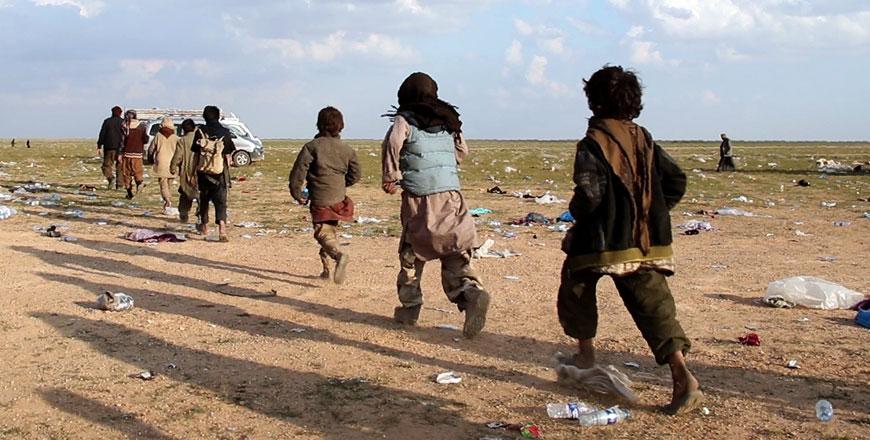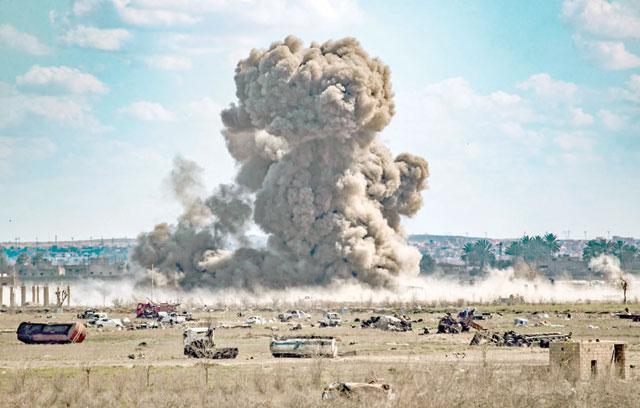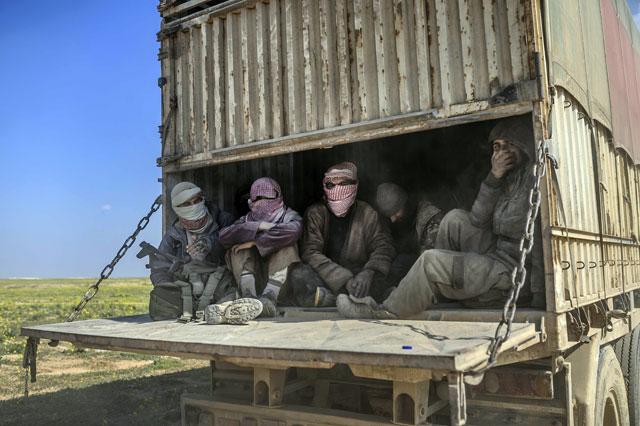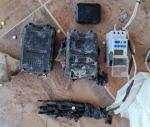You are here
Syria force takes Daesh bastion, 'caliphate' wiped out
By AFP - Mar 24,2019 - Last updated at Mar 24,2019
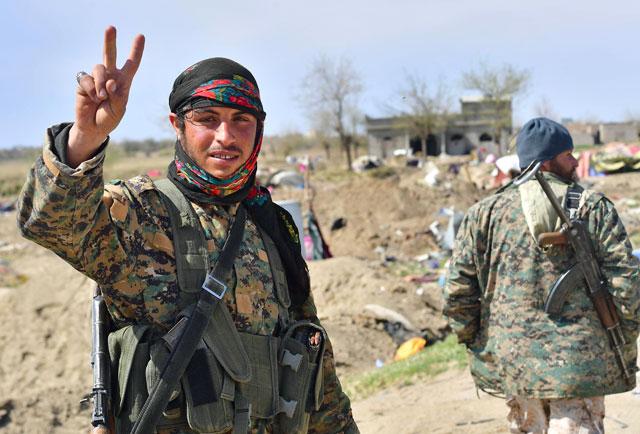
This photo taken on Saturday shows a fighter of the US-backed Kurdish-led Syrian Democratic Forces flashing the V for victory sign in the fallen Daesh group's last bastion in the eastern Syrian village of Baghuz after defeating the extremist group (AFP photo)
BAGHOUZ, Syria — Kurdish-led forces pronounced the death of the Daesh group's nearly five-year-old "caliphate" Saturday after flushing out diehard extremists from their very last bastion in eastern Syria.
Fighters of the US-backed Syrian Democratic Forces raised their yellow flag in Baghouz, the remote riverside village where militants of a variety of nationalities made a desperate, dramatic last stand.
The SDF's victory capped a deadly six-month operation against the final remnants of the caliphate which once stretched across a vast swathe of Iraq and Syria, and held seven million people in its sway.
World leaders hailed the victory as a major landmark in the fight against Daesh and its ideology, but warned that the group that spurred a spate of global terror attacks was far from defeated.
"Syrian Democratic Forces declare total elimination of so-called caliphate and 100 per cent territorial defeat of ISIS," spokesman Mustefa Bali said in a statement, using another acronym for Daesh.
In Al Omar, an oil field used by the SDF as a staging base, fighters in their best fatigues laid down their weapons and broke into song and dance.
They joined top Kurdish and Arab tribal officials, as well as a leading US envoy, for a ceremony unveiling a monument to their fallen comrades and celebrating the landmark victory.
The state proclaimed in mid-2014 by fugitive Daesh supremo Abu Bakr Al Baghdadi started collapsing in 2017 when parallel offensives in Iraq and Syria wrested back its main hubs Mosul and Raqa.
The nearly five years of fighting against the most brutal extremist group in modern history left major cities in ruins and populations homeless.
Foreigners last
The territory administered by the remnants of Daesh continued to shrink month after month and in September 2018 the SDF launched a final offensive on the last dregs of the “caliphate” in its Euphrates Valley strongholds.
SDF fighters last week expelled Daesh fighters who refused to surrender from an encampment on the edge of Baghouz and have since been hunting down a few survivors hiding on the reedy banks of the Euphrates.
“Those who lasted the longest were mostly foreigners... Tunisians, Moroccans, Egyptians,” Kurdish fighter Hisham Harun, 21, told AFP.
Around him, the former extremist encampment was littered with bullet-riddled truck carcasses, discarded suicide belts and torn tents where the caliphate’s last families sheltered for weeks.
Some bodies of suspected Daesh fighters could also be seen.
According to the Syrian Observatory for Human Rights, the offensive has left 630 civilians, 750 SDF fighters and around 1,600 extremists dead.
Kurdish officers and aid groups were flummoxed by the number of people who poured out of Baghouz, a small village even few Syrians knew of until this year.
As SDF forces pummelled Daesh positions and US warplanes dropped huge payloads on the riverside village, tens of thousands of people fled over a rocky hill.
Aid emergency
For weeks, the ghostly figures of the caliphate’s last denizens hobbled out of the besieged village, famished, often wounded but sometimes still defiantly proclaiming their support for Daesh.
The Kurdish-led force and foreign intelligence have screened more than 60,000 people since January, around 10 per cent of them militants turning themselves in.
Most of the people evacuated from the smouldering ruins of Baghouz in recent days were relatives of Daesh members who now fill overcrowded camps further north in Syria’s Kurdish-controlled region.
The biggest of them, Al Hol, is struggling to host 74,000 people, including at least 25,000 school-aged children.
Among them are thousands of foreigners from France, Russia, Belgium and 40-plus countries that are in most cases unwilling to take them back.
“The needs are huge and the camp is overwhelmed,” Peter Maurer, president of the International Committee of the Red Cross said on Friday upon returning from a five-day visit to Syria.
Still a threat
Speaking at the ceremony in Al Omar, top SDF commander Mazloum Kobani warned that a new phase had begun in anti-Daesh operations.
The US has vowed to draw down its forces in Syria, but Kobani appealed for sustained coalition assistance to help smash sleeper cells “which are a great threat to our region and the whole world”.
US coalition envoy William Roebuck agreed and said “we still have much more to do to achieve an enduring defeat” of Daesh.
French President Emmanuel Macron hailed the fall of Baghouz saying “a significant threat to our country” has been “eliminated”. British Prime Minister Theresa May chimed in, calling Saturday’s victory “a historic milestone”.
The extremists retain a presence in eastern Syria’s vast Badia desert and various other hideouts from which they could wage the kind of deadly guerrilla insurgency that accompanied the rise of the Daesh group.
John Spencer, a scholar at the Modern War Institute at West Point, warned that while the geographic caliphate had been dismantled, Daesh was far from defeated.
Daesh “is a terrorist organisation, all they have to do is put down their weapons and try to blend in with the population and just escape”, he told AFP. “They’re not gone, and they’re not going to be gone.”
After almost five years of fighting and heavy losses, the Kurds are now exposed to threats from both Damascus and Turkey.
Kobani appealed for dialogue with both as another page of the deadly eight-year-old Syrian conflict is being turned.
Related Articles
OUTSKIRTS OF BAGHOUZ, Syria — Daesh faces final territorial defeat as the US-backed Syrian force battling the extremists said on Saturday it
BAGHOUZ, Syria — Kurdish-led forces supported by air strikes from an international coalition evacuated civilians held as "human shields" Mon
NEAR BAGHOUZ, Syria — Daesh looked close to defeat in its last enclave in eastern Syria on Wednesday as civilians poured out and the US-back


